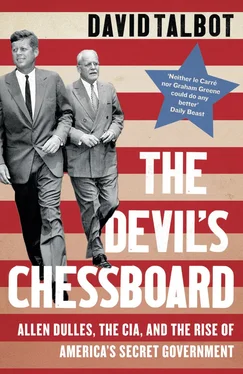One of the least happy aspects of the Roosevelt presidency was the bitter internal battle over the plight of European Jews. FDR was a man of conscience but also an intensely political creature. The president—who was briefed from time to time in the White House by longtime supporters such as Rabbi Stephen Wise of New York and other Jewish leaders—was keenly aware of the imminent danger facing the Jewish population in Hitler’s increasingly hostile dominion. In the spring of 1938, a year before the voyage of the St. Louis , Roosevelt began discussing a plan to rescue millions of German Jewsand resettle them in ten sympathetic countries. He vowed that he would request $150 million from Congress to implement the plan.
But Roosevelt found himself ensnared in political complications. He faced powerful nativist and anti-immigration sentiments in Congress, which reflected the mood of the country—feelings that had only hardened in the Depression’s savagely competitive job market. The president, who knew that he was widely perceived as a friend of the Jews, wanted to avoid appearing too beholden to them. This became particularly urgent as the 1940 presidential election neared, with FDR aiming for an unprecedented third term. In the final analysis, the president believed that the only way that the people facing Nazi persecution might be saved was through U.S. military intervention against Hitler. And with prominent isolationist crusaders like Charles Lindbergh labeling the looming European conflict a Jewish war, FDR realized that this was another reason not to appear too impassioned about the refugee crisis.
As the debate raged within the administration, millions of lives hung in the balance, including those on board the St. Louis . If Henry Morgenthau was the voice of moral imperative in Roosevelt’s government, then Breckinridge Long, the assistant secretary of state in charge of immigration, was its avatar of cynicism. Long used his bureaucratic wiles to frustrate Roosevelt’s efforts to ease the restrictive immigration policies of the Depression era. In June 1940, he circulated a memoamong his department officials, proposing that they delay for an “indefinite length [of time] the number of immigrants [allowed] into the United States. We can do this by simply advising our consuls to put every obstacle in the way and to require additional evidence and to resort to various administrative devices which would postpone and postpone and postpone the granting of the visas.”
As a result of Breckinridge Long’s delaying tactics, 90 percent of the quota places reserved for refugees from Hitler’s and Mussolini’s dark realms were never filled. This meant that another 190,000 souls who could have escaped were trapped inside Europe’s burning building.
One Morgenthau aide later called the Long cabalwithin the State Department “an underground movement … to let the Jews be killed.” At one point, Morgenthau himself—who always tried to restrain himself in these debates so as not to appear a “special pleader” for the Jews—felt compelled to confront Long directly. “ Breck, we might be a littlefrank,” began the gentlemanly Treasury secretary. “The impression is all around that you are particularly anti-Semitic.”
Long was convinced that he was being persecutedby “the communists, extreme radicals, Jewish professional agitators [and] refugee enthusiasts.” He was part of the State Department’s deeply entrenched, high-born culture—a WASP aristocracy that regarded immigrants, particularly those non-Christian newcomers from central and eastern Europe, as socially offensive and potentially subversive. Anti-Jewish attitudes in this insular club were so deeply ingrained that they were reflexive.
Perhaps not surprisingly, then, when young Allen Dulles was serving in the U.S. embassy in Turkey, his first overseas posting after World War I, he fell for the most notorious anti-Jewish fabricationin history. One day the young American diplomat was given a copy of The Protocols of the Elders of Zion by a British reporter who had fished the scurrilous document out of a secondhand bookstore in Istanbul’s old European quarter. The Protocols purported to offer a secret plan for Jewish world domination, and included tales about Christian children being sacrificed for Passover feast rituals and other lurid fantasies. By the time Dulles got his hands on the book, which was the creation of the Russian czar’s anti-Semitic secret police, the document had been widely denounced and discredited. But Dulles took it seriously enough to send a coded report about the secret Jewish “plot” back to his superiors in Washington.
Atavistic ideas about exotic Jewish “outsiders” were still widely prevalent in the State Department in June 1939 as the St. Louis lingered along the Eastern Seaboard, its food and water supplies running low. In the end, the Long faction in the Roosevelt administration would prevail in the debate over the ship. Captain Schroeder was forced to turn his ocean liner around and return to Europe, docking in Antwerp, Belgium, on June 17 after a month at sea, and disgorging the men, women, and children on board to their fates. Less than three months later, Hitler invaded Poland, and Europe went to war. More than 250 of the St. Louis ’s passengers would be swallowed by the Holocaust.
As the war began, the struggle to save Europe’s Jews was far from over. President Roosevelt continued to be pushed and pulled by both sides of the increasingly tumultuous refugee debate. Initial reports about the mass evacuations of Jews to death camps in the German and Polish countryside were vague. The State Department bureaucracy bottled up much of the information, so there was a great deal that Roosevelt never saw. Humanitarians like Rabbi Wise desperately sought solid evidence of the Nazi extermination machine, which they knew was essential in order to convince FDR to take decisive action.
This was the desperate situation as Dulles began monitoring European developments—first from his OSS office in Rockefeller Center and later from his post in Bern. Among Dulles’s confidential sources was a German industrialist who was the first prominent figure inside the Nazi domain to provide credible information about the early stages of the Final Solution. The stories that the industrialist brought across the Swiss border were almost too monstrous to believe. The information that began flowing into neutral Switzerland, the listening post for war-torn Europe, should have helped force drastic Allied action. But it did not.
On July 17, 1942, Heinrich Himmler’s luxurious private train—equippedwith a dining room, shower, and even a screening room—pulled into Auschwitz, a backwater town in the swampy flatlands of southern Poland. Word quickly spread about the Reichsführer’s unusual visit, soon reaching Eduard Schulte, the chief executive of a major German mining company with property in the area. What had brought Himmler to this forlorn destination? Schulte reckoned that it must have something to do with the rapidly expanding prison camp outside town, where IG Farben had built a factory to utilize the camp’s slave labor.
It is not widely recognized that the Nazi reign of terror was, in a fundamental way, a lucrative racket—an extensive criminal enterprise set up to loot the wealth of Jewish victims and exploit their labor. The chemical giant Farben was at the forefront of integrating concentration camp labor into its industrial production process, with other major German corporations like Volkswagen, Siemens, and Krupp following closely behind. Himmler’s SS empire moved aggressively to cut itself in on the spoils, extracting sizable payments from these companies for providing them with a steady flow of forced labor. Schulte, who was afraid that the rapidly expanding Auschwitz complex would begin to intrude on his own company’s mining properties, immediately took a wary interest in Himmler’s visit.
Читать дальше











